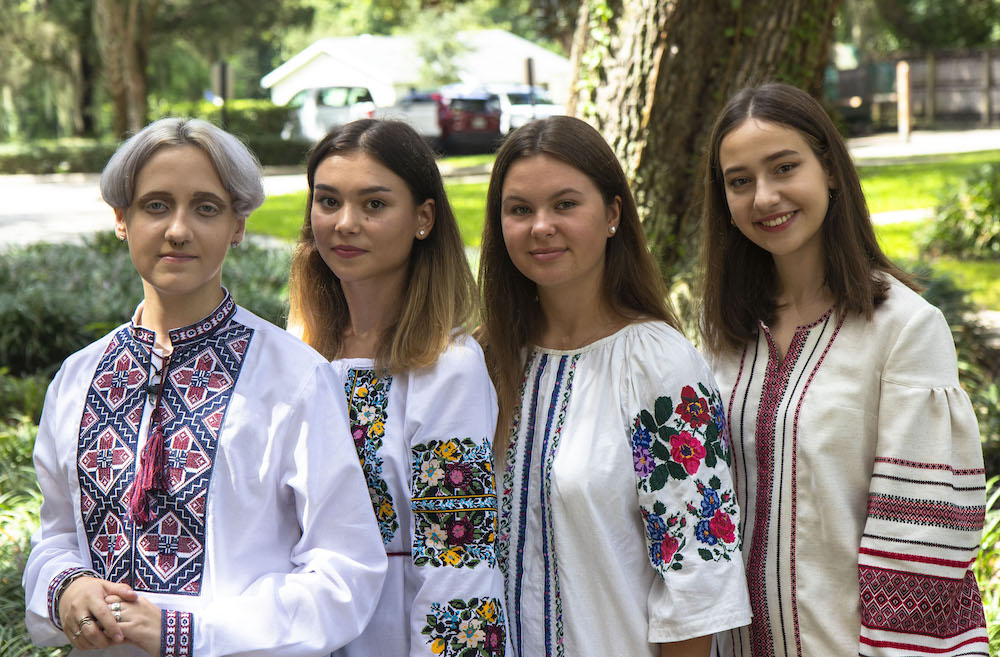
Away From Home, Ukrainians Find Peace At Stetson


The David and Leighan Rinker Center for International Learning

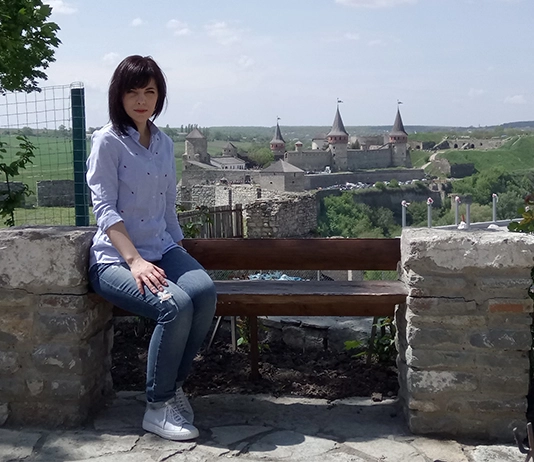
By Camila Morales Hernandez, ’20
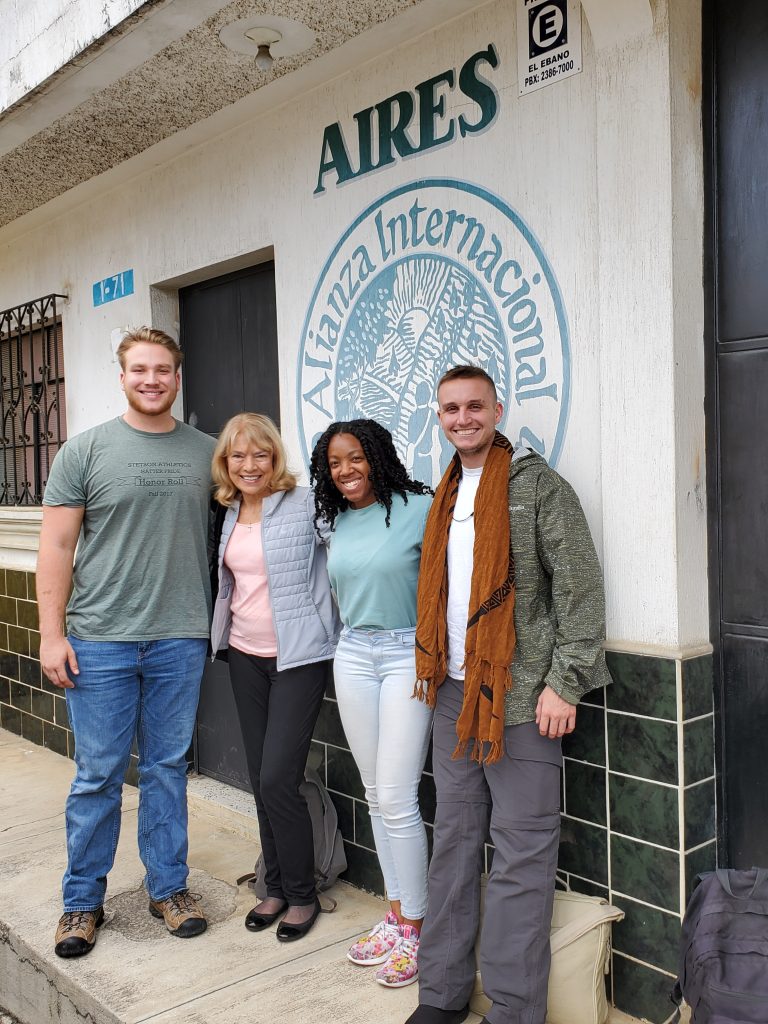
Over the summer, the Stetson students, Sydney Arrington, a Public Health major/Spanish minor, Peter Gruebel, also a Public Health major; and Matinicus C’Senger, double major in Economics and Philosophy and an Environmental Sustainability Fellow at Stetson, did a summer internship with AIR (Alliance for International Reforestation, Inc) Guatemala. During the experience, the students were able to work closely with local farmers to learn the practice of Regenerative Farming. The students also spoke Spanish during the entire time of the experience.
WHAT IS AIR GUATEMALA?
AIR is a non-profit organization improving human and environmental health in Guatemala. With operations in Atlanta, Georgia and central Guatemala, AIR has trained over 4,000 farm families and planted almost 6 million native trees in Guatemala. For over 25 years, AIR has implemented a community-based, five-year approach with great results and success. AIR is a winner of the 2017 Equator Prize from the UN Environment Programme because of this successful model. All salaried employees are local professionals, so ninety-two percent of funds and donations go straight to the field to implement projects and programs: Rural school programs; tree nurseries; farmer training; and efficient, custom stoves. AIR was founded in 1992 at Stetson University after Dr. Anne Hallum, Stetson University political professor, visited Guatemala for the first time and observed first hand the rural hunger and malnutrition, the barren mountainsides and mudslides, and the strength of the Maya people.
GOALS, PROCESS AND ACADEMIC PURSUITS:
Each year, one to three Stetson students are selected to participate in the AIR Guatemala internship program. All of their program expenses are covered by a generous endowment by Drs. David and Leighan Rinker. The main goal of the internship is for the student to provide tangible benefits to the local residents. Likewise, the experience is designed to align with the academic pursuits of the students.
Learning goals for the student interns include:
FOOTPRINT LEFT IN GUATEMALA
The three students supported the construction of three fuel-efficient stoves which involved mixing cement, soaking and laying bricks—each stove required six-hours of work. The stoves have a chimney to ventilate smoke and prevent lung diseases; they also help to conserve trees.
The volunteers this summer—including the three students—planted approximately 2,000 trees. The trees were strategically located to prevent soil erosion and improve crops with nitrogen-fixing roots; prevent mudslides, and to protect water sources. As previously mentioned, the students taught AIR staff members and Dr. Hallum how to use the technology for photographing and syncing each tree. By the end of the two weeks, the team had registered and sold 886 trees to a company in Hong Kong.
The three students also participated in two rural school programs—helping to judge environmental contests and playing with children.
THE ADVENTURE DOES NOT STOP THERE!!
Apply to join this journey and work with Guatemalan communities in Summer 2020!!! Applications are due by February 1, 2020.
This article was written based on Dr. Anne Hallum’s annual Air Guatemala report.
by Gabby Cassidy
Over Spring Break 2019, WORLD ambassadors Zoe Weaver and Caylyn Gunby attended the Global Student Leadership Summit in Boston, MA.

This conference, for students who had participated in study abroad and other international programs, had a goal to help them develop skills as successful global leaders. It also focused on students from diverse and underrepresented populations, such as first-generation, racial/ethnic minority, students with disabilities, high financial need, LGBTQ+, etc. Many face obstacles acquiring educational and leadership opportunities.
Throughout the conference, Weaver found herself learning more than she expected from the sessions. She was pushed to see the bigger picture of education abroad.
“I was pushed to see my study abroad as a time that I developed personally and was finally able to articulate the challenges of my trip to those who would understand. Then, after listening to others tell their own stories, I realized that we each had a unique experience that created the larger picture of diversity abroad.”
The connections she made with other students helped her to understand her own experiences and the education she received while studying in South Korea and Taiwan. Weaver also learned about the importance of diversity in study abroad and was inspired to do more here at Stetson. She expressed her desire to connect with the Black Student Association, the Asia Pacific American Coalition, the Caribbean Student Association, and other multicultural organizations to develop more initiatives to get their members involved in study abroad programs.
“Although being a woman brings its own challenges to international travel, I further developed an understanding of my privilege during this conference as an able-bodied, white, American student. Through this understanding, I began to build a standard for myself when it comes to becoming an ally both abroad and domestically to students who lack the opportunity to do the same as I.”
Gunby felt that the conference was a great professional opportunity for her. The panels and speakers had a profound impact and helped her feel confident in her plans post-graduation. The chance to connect with graduate schools and professionals, as well as other students in her same positions, helped her to reflect on her identity and improve her confidence in speaking about her experiences.
“Being able to speak with professionals who are now in International Education, who taught English abroad through JET, Fulbright, and TAPIF made me feel like I was taking the right steps towards a career in International Education or International Affairs.”
Gunby would like to bring more networking opportunities to Stetson’s campus for international careers. Events such as the Global Citizenship Fair and Acerima could benefit from having a keynote speaker or speakers from minority groups.
“The keynote speakers at the conference were inspiring and helped all of the students get involved and excited about the activities.”
Overall, her experiences at the Global Leadership Summit helped her to grow professionally as well as to have more confidence in her abilities and plans for the future.
A total of 10 Stetson University faculty and the WORLD Team descended on Santo Domingo during May 13-18, 2019 to learn how to better prepare students to learn abroad. Faculty hailed from business, education, humanities, social and natural sciences.
Ready, set, teach abroad!! @StetsonWORLD launches its inaugural International Faculty Development Seminar in Santo Domingo to teach @StetsonU faculty how to teach abroad. #stetsonu #teachabroad #studyabroad #facultydiversity #facultydevelopment pic.twitter.com/11zueDRd1g
— BrownCenter@StetsonU (@browncenter_su) May 17, 2019
The seminar comprised classroom sessions on topics ranging from risk management and internationalization to curriculum integration and course assessment. Field trips to heritage locations and natural landscapes, such as the old colonial sugar mills and Three Eyes National Park, helped faculty consider the role of “place” in course design as well as how to balance high and low intensity learning experiences for students.
Get ready to dance! @StetsonU Professors Teresa Camody and Meg Young receive a warm welcome at the Congos de Villa Mella, a #UNESCO World Heritage Site dedicated to the retention & preservation of African roots & culture in the #DominicanRepublic #theRealDR pic.twitter.com/nnDtZMF1By
— BrownCenter@StetsonU (@browncenter_su) May 19, 2019
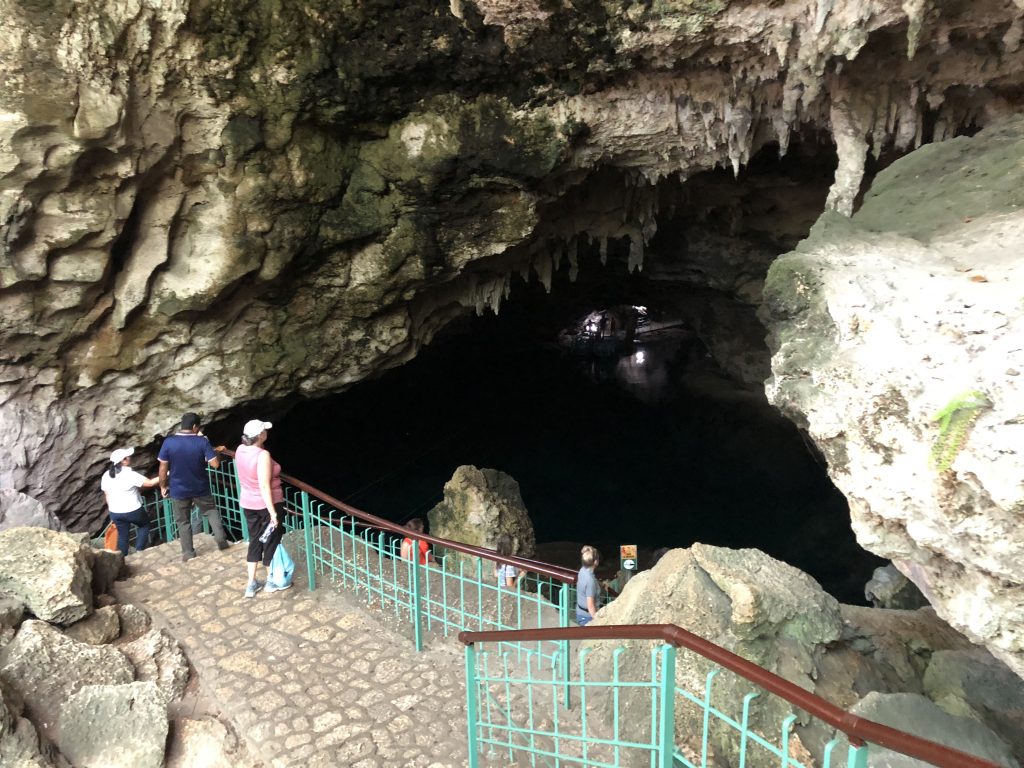
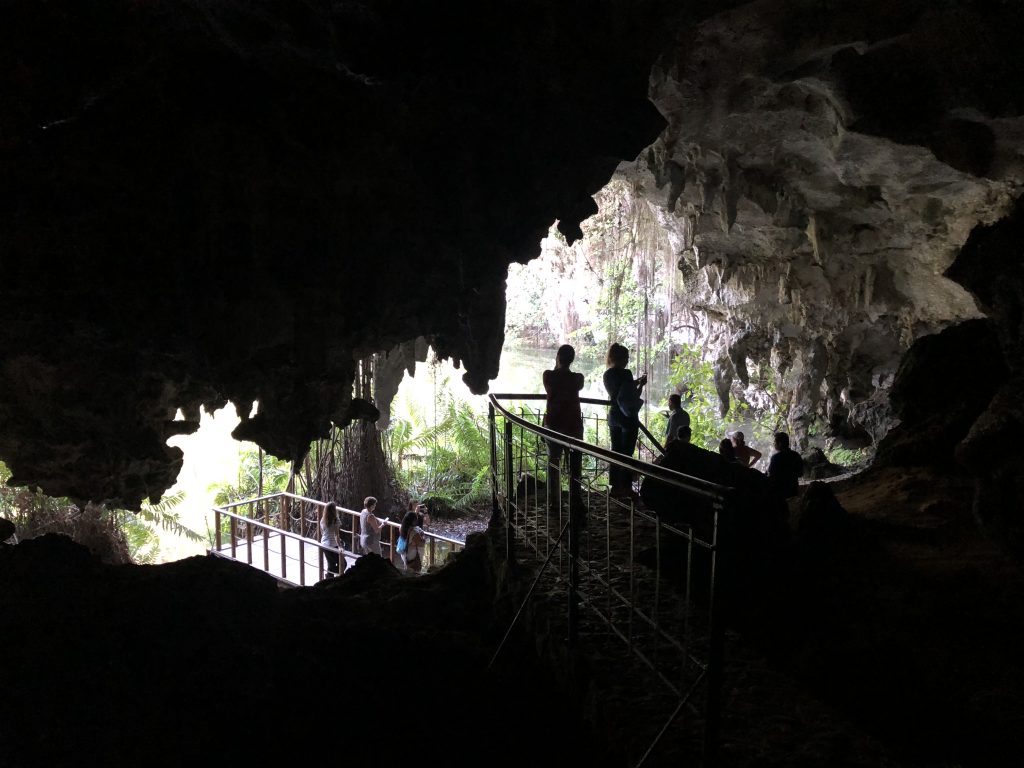
Response to the seminar has been quite positive.
“I feel so fortunate to be part of the journey we were on together. I feel that our relationship went to the next level…The moment we started together and ended pleasantly, it was a lesson in every moment and I am confident that this training will be helpful for all in launching our faculty led programs in future.”
“Yes, echoing my colleagues for a wonderful opportunity and collegiality. Thank you WORLD and thank you everyone who participated 😍”
“Thank you all for such a unique and valuable experience in DR. I would be happy to meet for regular lunches sharing ideas about the next steps in organizing faculty-led study abroad trips. Special thanks to the WORLD. You are a great team of professionals!🤗”
“I’m continually amazed at and proud to be a part of Stetson’s wonderful community.”
More images
About the Stetson International Faculty Development Seminar
The IFDS program at Stetson University honors the longstanding commitment and dedication of Drs. David and Leighan Rinker to international learning. The centerpiece of the faculty development program is an immersive five-day experience where Stetson faculty participate in study abroad. The overarching goals are to equip Stetson teacher-scholars with best practice strategies for how to use location to deepen content, elevate student engagement and intercultural learning, develop safe, compliant and academically-rich study abroad programs, and promote Stetson’s value of global citizenship.
WORLD partnered with CIEE to co-offer the seminar. CIEE is a premier provider with significant expertise developing and implementing international faculty development seminars and study abroad experiences for students,. Contact [email protected] for more information.
https://www.stetson.edu/today/2018/08/stetson-alumna-receives-fulbright-award-to-germany/
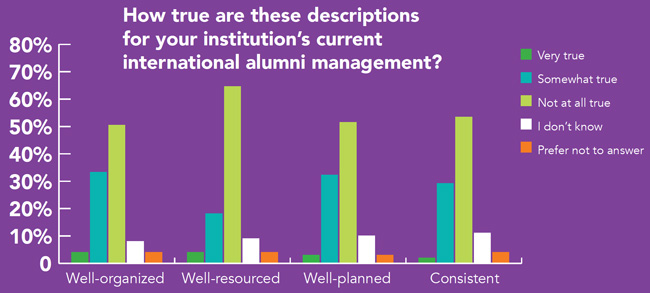
Survey respondents’ self-assessment of their institutions current global alumni engagement efforts. Source: Academic Assembly/Intead
A majority of US college administrators say that their institutions are not doing enough to connect with international alumni, and nearly two-thirds report having no dedicated staff time for global alumni relations.
These are some of the top-line findings from a new study released today by Academic Assembly and Intead. Global Alumni Management for U.S. Institutions: The State of the Field in 2017 gathers responses from 103 administrators at American colleges and universities for a first-ever national benchmarking survey of best practices in international alumni relations.
The overarching observation in the study is that there is considerable room for institutions to improve their engagement with international graduates. As the following chart reflects, most respondents do not rate their institution’s current efforts very highly.
The survey respondents most commonly cited “insufficient time” (51%) and “inadequate budget” (28%) as the main impediments to expanding their institution’s global alumni engagement. Nearly one in three respondents (30%) also noted “insufficient internal leadership support” as a significant issue.
If these results represent a baseline for international alumni relations in the US, they come as no surprise to Mitch Leventhal, former vice chancellor for global affairs at the State University of New York, and now chairman at Academic Assembly: “In my decade serving as a senior international officer I never once heard a colleague indicate anything close to satisfaction with their alumni outreach efforts, while I heard many bemoan the seemingly disinterest of their president and/or alumni association in investing any resources into leveraging this valuable asset.”
At the same time, the survey respondents identified strong awareness of a number of key benefits to greater engagement with international alumni. Chief among those, as reflected in the following table, was the role that alumni can play in international recruitment. Indeed, more than 50% of responding administrators said that they felt that global alumni management was “very important” to their international recruitment and branding efforts.
“It’s not just what happens to [the student] as a 22-year-old graduate,” says Gretchen Dobson, one of the primary authors of the report and the vice president of alumni and graduate services with Academic Assembly. “It’s about their lifelong relationship with the institution.”
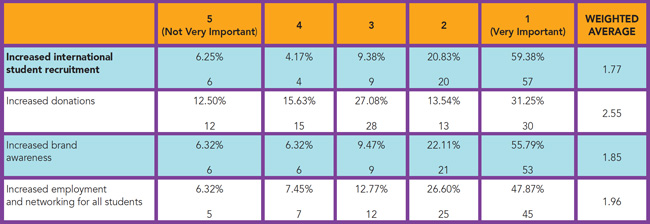
Respondent perceptions of the value that global alumni offer to the institution. Source: Academic Assembly/Intead
Other important benefits noted by respondents include: increased fundraising opportunities and expanded connections to employment opportunities and professional networks for alumni and students.
“The purpose of international alumni relations is to leverage the support of this potential group of brand ambassadors,” says the study report. “The cumulative effect of this will increase your global brand projection, boost enrolment and fundraising, and create new employment opportunities for current students and recent graduates. It’s about making good use of the powerful resources you already have.”
Ms Dobson, who led international alumni efforts at Tufts University for a decade and now consults and writes widely on the subject today, offers a straightforward path to better global alumni relations.
First, put some good, basic data systems in place to capture information about international graduates. Next, start small and build from there – in other words, do what you can but make international alumni part of what your institution does. Finally, recognise the importance of buy-in from senior leadership.
The study picks up the question of data management in calling for an entirely new classification for foreign graduates: transnational alumni, a term that recognises that international graduates may go on to further work or study in the US, in a third country, and/or return to their home country over time. “Capturing this kind of nuance requires a commitment to internationalising your [data] systems and annually inviting alumni to update their contact information,” says the report.
This is a distinction that makes a lot of sense to Anne Hayner, the associate director for alumni relations with the University of Notre Dame’s Kroc Institute for International Peace Studies. International networking and engagement with foreign graduates are both central to the institute’s programmes, and Kroc has a long-established and active network of global alumni as a result.
Even so, Ms Hayner points out that any institution can begin to strengthen their efforts in this area, even with modest budget or staff resources. “Start with the students you have [on campus] now,” she says. “Connect with them and make sure they feel connected to you. Then have a way to capture and update contact information over time whether that’s a simple Google Form or whatever else.”
On the question of engaging with an alumni network, Ms Hayner again offers a straightforward approach: “Ask people what they need or want,” she suggests. “For example, part of my job is to help the students professionally network. So we keep them advised of what people are doing in the field through professional or alumni profiles, and we help them to stay connected to faculty or research resources so that they can stay on top of contemporary scholarship in the field.”
The benchmarking study echoes the value of starting small and demonstrating success as a means of building linkages within the institution as well as the buy-in of institutional leaders. In practice, global alumni initiatives may originate from different points within the organisational chart, most often from the international office or the alumni or advancement office. The report cautions, however, that, “International alumni relations can’t be managed in a vacuum…Reasonable expectations must be set for interdepartmental cooperation, and a reasonable budget must be allocated. Ideally, a cross-functional team from admissions, advancement, international programmes, and career for grassroots alumni engagement.”
Needless to say, the study is focused on the current context for global alumni relations in the US. However, readers in many other host countries will no doubt recognise many of these same characteristics and perspectives within their own institutions. With that in mind, it is fair to say that the findings and recommendations in the benchmarking report offer important insights for international educators around the world.
For additional background, please see:
Article from ICEF Monitor, posted December 6, 2017
- Stetson University’s International Student Success Initiative strives to bolster services to improve success for foreign students and alumni. A new national report highlights several exciting opportunities for student success. Stetson University is already ahead of the curve in addressing a number of these recommendations through this initiative.
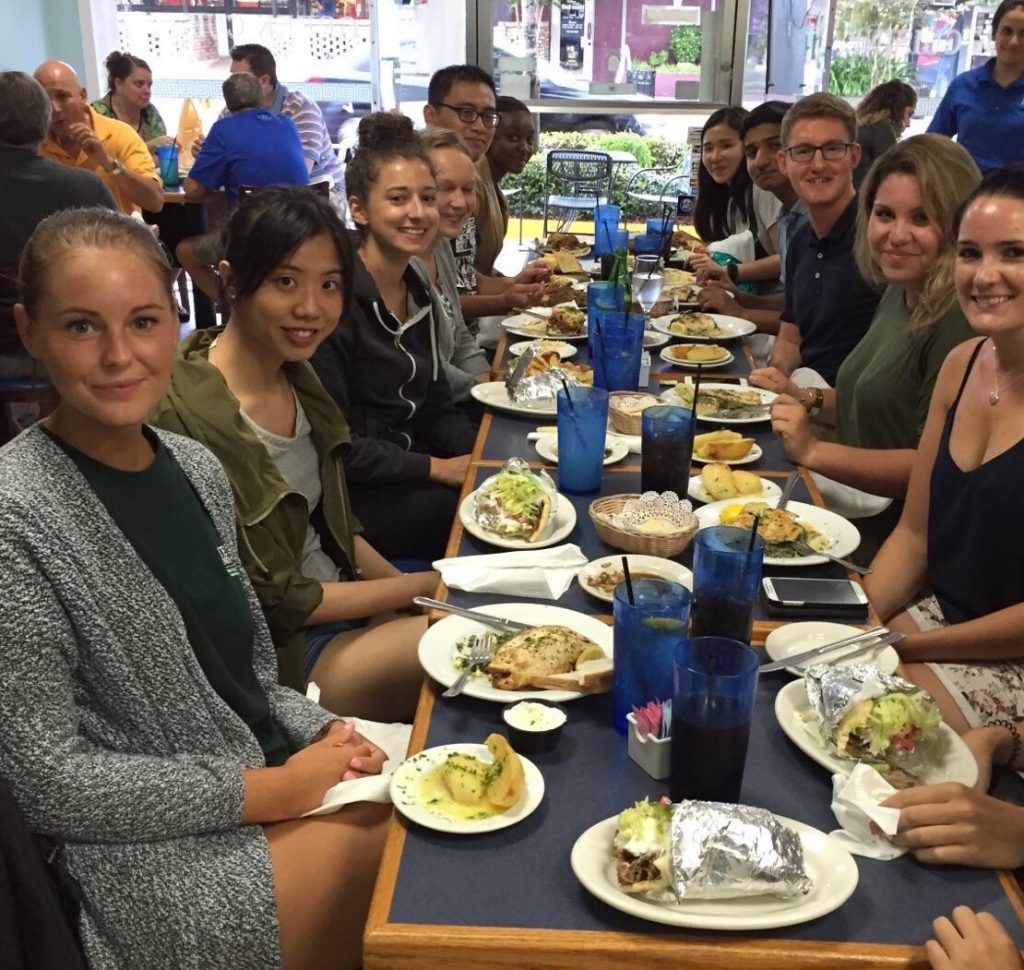
The WES Research report takes a look at how 1,095 U.S-educated foreign students fare in the job market post-graduation and evaluates alumni impressions of how well their alma maters prepared them for success. The following are key findings of the report:

Over half of current students surveyed had not yet used the career services at their institutions, primarily because they were not yet ready for the job search. Nearly two-thirds of alumni used campus career services while enrolled. Both current students and alumni were most satisfied with résumé (or CV) and cover letter writing preparation services, as well as career preparation seminars and workshops. Both groups reported some dissatisfaction with interview preparation services and services that connect them to potential employers. A related WES Research study revealed that career services is among the most important student service to many international students.
Stetson’s International Student Success Initiative has tackling recommendations addressed in the two reports:
Elements of this article were taken directly from the WES Research Report.

Welcome to Stetson’s Deland campus! New international students strike a pose at Palm Court.

Dinner in downtown Deland

Students celebrated the Labor Day holiday at Daytona Beach.
WORLD and the Office of Institutional Research and Effectiveness collaborated on the development of an interactive data visualization tool. The new Global Community Engagement Dashboard is designed to enhance Stetson University’s comprehensive internationalization efforts and position the University for opportunity planning around international and intercultural learning.
The first phase of the project focuses on Stetson’s global footprint including geographic diversity of students, international student enrollment and academic achievement. The dashboard illuminated several strategic findings:

The dashboard was unveiled at the New International Parent Luncheon on August 16, 2017. The project is spearheaded by Roxanne Lewis, international student and scholar services coordinator at WORLD and Angela Henderson, director of Institutional Research and Effectiveness. The next phase of project development will highlight student and faculty engagement in international study.
I invite you to use the interactive dashboard to run reports and get useful information on Stetson’s global footprint.
Resche Hines, Ph.D.
Assistant Vice President of Institutional Research and Effectiveness
Angela Henderson
Director of Institutional Research andEffectiveness